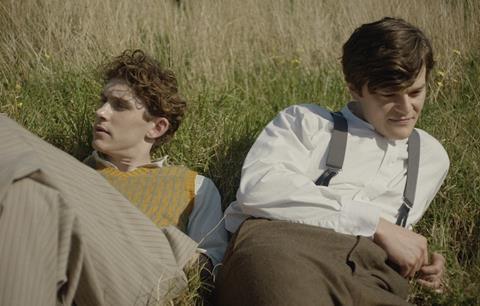Fionn O’Shea is a gay novelist struggling with the homophobia of 1920s England in this surprisingly staid period debut

Dir/scr. Will Seefried. South Africa/UK/US 2024. 97mins
Period drama Lilies Not For Me pursues a serious purpose in exposing a horrifying, now largely forgotten aspect of the history of homophobia. But debut writer-director Will Seefried – creator and co-star of Laura Linney miniseries Sink Sank Sunk – goes about exploring the theme in a bizarrely uneven way, with mismatched registers resulting in a discordant mix of decorous heritage pic and borderline-Gothic melodrama. Solid performances keep things on an even keel, and the film may have some limited traction in LGBTQ+ channels following its Edinburgh premiere. But younger viewers are likely to find it old hat and altogether coy – at least, when it’s not striving for incongruous shock effect.
An odd mixture of coy delicacy and clunking overstatement
Set in England in the early 1920s, the story focuses on Owen (Fionn O’Shea), a young writer struggling with his second novel while resident as a patient in a medical institution where he is being treated to ‘cure’ his homosexuality. In between injections that make him violently nauseous, he has practice teatime ‘dates’ with eager-to-help young nurse Dorothy (Erin Kellyman) to prime him for heterosexual attraction.
Flashbacks cover Owen’s earlier sojourn at a spartan cottage in the country, where he is visited by old friend Philip (Robert Aramayo), a medic who has survived the horrors of the First World War. In this balmy, paradisal milieu, the two men’s mutual attraction comes to the fore – but Philip announces that their feelings are wrong and must be corrected. Before that happens, however, the men agree to give their desires free rein, resulting in an idyllic spell of erotic romance, captured in poetic close-ups of skin on skin.
Both men seem so content with their interlude that it comes as a surprise when Philip announces that it is time to nip passion in the bud, proposing a radically grisly medical method – although the relative lack of blood involved, and the surprisingly brief and painless recovery time, stretch plausibility somewhat, as does the cursory treatment of a hapless interloper who serves as unwitting donor.
Then another visitor drops in, Charles (German actor Louis Hoffman, convincing as a dashingly flirtatious Brit), in search of his missing father. Despite the apparent urgency of the situation, Charles decides to hang around for a while, to take a naked open-air scrub-down and to teach Owen a dance called the Grizzly Bear. Events take a more intimate turn still – up a tree, suitably for this bucolic setting – triggered by Owen’s recitation of the verse by 19th-century poet Digby Mackworth Dolben that gives the film its name.
Startling shifts of tone define this awkwardly conceived film: it’s hard to know how reliable the rural flashbacks are, or whether they are filtered through Owen’s novelistic imagination, but they fail to gel convincingly. The country sequences are presented in a wistfully aestheticized way that harks back to the ‘white linen’ heritage dramas associated with 1980s Merchant-Ivory, and generally to the gay-themed films (Maurice, Another Country) of the period. By contrast, the hospital scenes evoke a cold, prison-like enclosure, where Owen is manhandled by a wrestler-like attendant.
But sticking out like a sore thumb is the (historically real) medical intervention espoused by Philip. We don’t see anything graphic, but we are certainly likely to wince – partly in discomfort, partly because it involves so jarring a shift of tone. Then there is the final scene, where director Seefried throws caution, and realism, to the wind in his imagery (including a glimmer of the perennial gay iconography of Saint Sebastian).
The acting at least provides credible ballast. Game Of Thrones and The Rings Of Power alumnus Aramayo is by turns bluff, tender and oddly menacing, while Kellyman, whose TV includes Top Boy and Willow, gives Dorothy a little more edge than the gauche solicitousness that her role mostly requires. O’Shea – best known for Normal People and Masters of the Air (and, like Kellyman, a former Screen Star of Tomorrow) – struggles bravely against the potentially insipid depiction of Owen, peppering it with rebellious irony in the hospital scenes. For much of the film, however, the young writer is painted as a fragile, starry-eyed aesthete who clearly shouldn’t be hiding away in the country when he could be enjoying a much brisker time among the literary ‘Lost Generation’ depicted in Terence Davies’s similarly-themed Benediction.
An overall visual staidness is underlined by a palette that goes heavily for stone and oatmeal for the country passages, while occasional costume touches feel oddly redolent less of the 20s than of an England still deep in the Edwardian age. Closing titles lay out the horrifying historical facts on which the drama is based. But director Seefried approaches this sexually benighted period with an odd mixture of coy delicacy and clunking overstatement. It’s surprising to find a young director making a film this determinedly old-fashioned, unless you read the film as a knowingly retro tribute to the bygone ‘love-that-dares-not-speak-its-name’ era of gay drama.
Production companies: Wolflight Films, Paradise City
International sales: Memento International sales@memento-films.com
Producers: Hannes Otto, Roelof Storm, Will Seefried, Naïma Abed, Emilie Georges
Cinematography: Cory Fraiman-Lott
Editor: Julia Bloch
Production design: Birrie Le Roux
Music: Theodosia Roussos
Main cast: Fionn O’Shea, Robert Aramayo, Erin Kellyman, Louis Hoffman, Jodi Balfour















![[L-R]: Amanda Villavieja, Laia Casanovas, Yasmina Praderas](https://d1nslcd7m2225b.cloudfront.net/Pictures/274x183/6/4/1/1471641_pxl_20251224_103354743_618426_crop.jpg)








